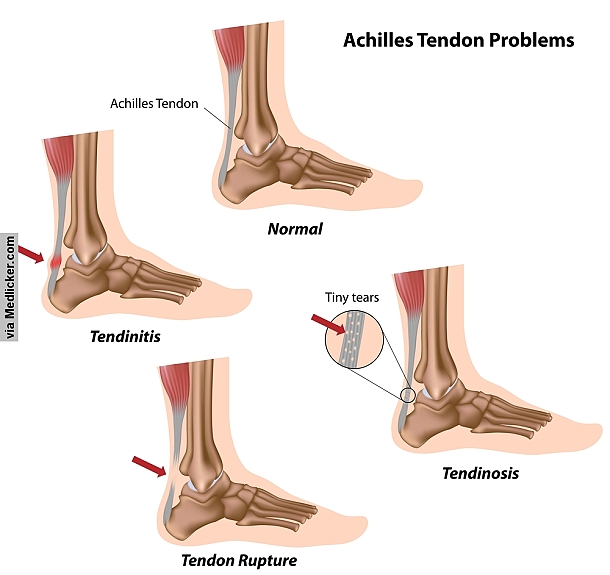An Achilles tendon injury can happen to anyone, whether you’re an athlete or just going about your everyday life.
The Achilles tendon is the largest tendon in your body. It stretches from the bones of your heel to your calf muscles. You can feel it — a springy band of tissue at the back of your ankle and above your heel. It lets you point your toes toward the floor and raise up on your tiptoes.
It’s common for this tendon to get injured. It can be mild or moderate and feel like a burning pain or stiffness in that part of your leg. If the pain is severe, your Achilles tendon may be partly torn or completely ruptured.
Causes
Achilles tendon injuries are common in people who do things where they quickly speed up, slow down, or pivot, such as:
- Running
- Gymnastics
- Dance
- Football
- Baseball
- Softball
- Basketball
- Tennis
- Volleyball
These injuries tend to happen when you start moving suddenly as you push off and lift your foot rather than when you land. For instance, a sprinter might get one at the start of a race as he surges off the starting block. The abrupt action can be too much for the tendon to handle. Men over 30 are particularly prone to Achilles tendon injuries.
These things also can make you more likely to have this kind of injury:
- You wear high heels, which can stress the tendon.
- You have “flat feet,” also called fallen arches. This means that when you take a step, the impact causes the arch of your foot to collapse, stretching the muscles and tendons.
- Your leg muscles or tendons are too tight.
- You take medicines called glucocorticoids or antibiotics called fluoroquinolones.

Symptoms:
The most obvious sign is pain above your heel, especially when you stretch your ankle or stand on your toes. It may be mild and get better or worse over time. If the tendon ruptures, the pain is instant and severe. The area may also feel tender, swollen, and stiff.
If your Achilles tendon tears, you may hear a snapping or popping noise when it happens. You could have bruising and swelling, too. You also may have trouble pointing your toes and pushing off your toes when you take a step.
Treatment
Minor to moderate Achilles tendon injuries should heal on their own. To speed the process, you can:
- Rest your leg. Avoid putting weight on your leg as best you can. You may need crutches.
- Ice it. Ice your injury for 20 to 30 minutes every 3 to 4 hours to reduce pain and swelling. Continue this for 2 or 3 days, or until the pain is gone.
- Compress your leg. Use an elastic bandage around the lower leg and ankle to keep down swelling.
- Raise (elevate) your leg. Prop your leg up on a pillow when you’re sitting or lying down.
- Take anti-inflammatory painkillers. Nonsteroidal anti-inflammatory drugs (NSAIDs) like ibuprofen and naproxen will help with pain and swelling. Follow the instructions on the label to help prevent side effects, such as bleeding and ulcers. Take them with food. Check with your doctor first if you have any allergies, medical problems or take any other medication. If you need them for longer than 7 to 10 days, call your doctor.
- Use a heel lift. Your doctor may recommend that you wear an insert in your shoe while you recover. It will help protect your Achilles tendon from further stretching.
- Practice stretching and strengthening exercises as recommended by your doctor, physical therapist, or other health care provider.
When Will I Feel Better?
It may take months, but it depends on how serious your injury is. Different conditions heal at different rates.
You can still be active while your injury heals. Ask your doctor what’s OK to do. But don’t rush things. Don’t try to return to your old level of physical activity until:
- You can move your leg as easily and freely as your uninjured leg.
- Your leg feels as strong as your uninjured leg.
- You don’t have any pain in your leg when you walk, jog, sprint, or jump.
Can I Prevent an Achilles Tendon Injury?
Here are some things you can try:
- Cut down on uphill running.
- Wear shoes with good support that fit well.
- Stop exercising if you feel pain or tightness in the back of your calf or heel.

Post a comment